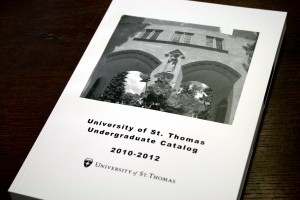The Undergraduate Curriculum Committee approved a revision of the neuroscience major earlier this month, which designates eight new courses in the neuroscience core curriculum.

The proposed changes are still subject to review by the entire St. Thomas faculty until April 17, but Michael Jordan, associate vice president for undergraduate studies, expects the changes will be approved.
“The revision adds some courses specifically designed for the neuroscience program to an existing interdisciplinary major and thereby strengthens the major,” Jordan said. “I would regard it, overall, as very useful but more or less a minor revision.”
Sophomore neuroscience student Liz Shearer said she likes the idea of adding designated neuroscience courses to the degree.
“That’s so cool. It’s like it’s real now,” Shearer said.
Prior to the revisions, courses with a specific neuroscience designation did not appear in the course catalog, but if the revisions pass, students will be able to choose from eight neuroscience classes, including two capstone courses, as early as fall semester.
“Whenever people ask me what a neuroscience major is I always say, ‘it’s psych and bio.’ I haven’t had any actual ‘neuroscience’ courses,” Shearer said.
The major will still be headed by the Interdisciplinary Neuroscience Program Committee, which includes biology and psychology professors.
Junior neuroscience major Megan Nystrom is excited to see what courses will be offered in light of the revisions.
“My introductory biology courses really had nothing to do with neuroscience. I think it’s better because you might get a deeper understanding and more experience with neuroscience,” Nystrom said.
An announcement letter from the INPC states that these changes should allow students to better “integrate findings from across diverse disciplines as they explore questions of nervous system development, function and behavior.”
Shearer said she decided on her neuroscience major because of the interdisciplinary aspect and likes the idea of having faculty specifically trained in neuroscience.
“It’s just cool to have people who are experts in that field,” Shearer said.
Jordan said the additional classes could affect the St. Thomas hiring process.
“I would expect that it will remain an interdisciplinary program, but when biology and psychology hire, they may be more likely to hire faculty with expertise in the neuroscience area to teach some of these courses,” Jordan said.
Patrick Roche can be reached at roch6667@stthomas.edu.


